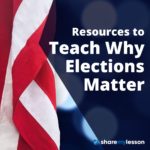This lesson examines the process of local decision making and its need for citizen input and compromise. Students simulate a local city/county council session and advise the council on public policy. Students are asked to consider the viewpoints of different citizen groups in order to reach a compromise that will benefit the entire community. This lesson can be used with a unit on local politics and can be adapted to reflect issues of compromise in your school or community. Free registration required to access the lesson plan.
Government and Politics Infographics
A set of government and politics infographics that teachers can print out for their students, use for their exams, or use to create posters for their classroom.
Civic Education and Election Resources

It’s election season in the United States and a good time for students to understand why local and national politics matter and the core principles on how our democracy and elections works. What is gerrymandering? How can we strengthen our democracy? Plan how to answer questions like these as Election Day draws closer. Use these free K-12 civic education lessons, activities, blogs and webinars to help you educate students on the election and the importance of counting every vote. Additional topics include fostering civil discourse, fighting fake news, voting rights and debate ideas to keep your students informed and engaged.
Selective Incorporation
Teachers can use this lesson as a supplemental resource in their federalism unit, their Supreme Court unit, or their civil rights and civil liberties unit to help students understand how some rights apply to the states and others don’t. This lesson includes a video from Sal in which he describes the basic concept of selective incorporation, a video about McDonald v. Chicago in which Kim interviews Alan Gura and Elizabeth Wydra about the facts and outcome of the case, and practice questions aligned to the new AP Government and Politics exam.
Should the Federal Government Regulate States’ Election Procedures?
Students will be able to identify and explain aspects of the election regulation debate, including its potential impact on voter turnout, election transparency, and voting equity.
Civics 360
Civics 360 is a comprehensive guide to middle school civics. Civics is all around us. Being informed about civics takes work. There is a lot to know about the government and how “We the People” interact with the government and each other. Use the resources in the modules to enhance your civic knowledge and skills.
Freedom Summer
In the summer of 1964, student volunteers from around the country joined organizers and local African Americans in a historic effort to shatter the foundations of white supremacy in Mississippi, one of the nation’s most segregated states . The website features historical background essays, bonus video of interviews with participants and original art work.
Federalism
“Federalism” is the word used to describe the Constitution’s system of dividing political power between the national government and the states. What is federalism and how does it work? Why did the founders build federalism into our constitutional system and what are the modern debates over federalism today? Explore the National Constitution Center’s Federalism learning module to learn more!